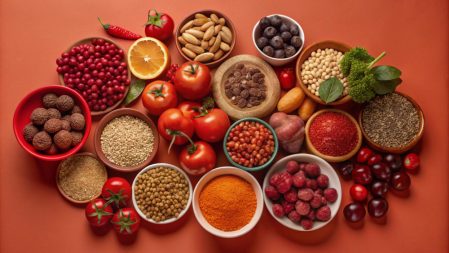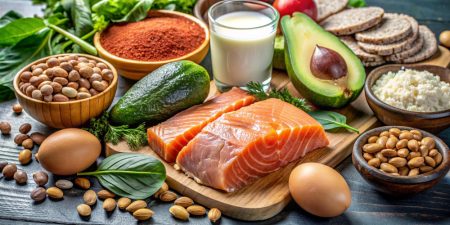Introduction
As we age, our nutritional needs evolve, and maintaining a balanced diet becomes even more crucial to support overall health and vitality. For seniors over the age of 60, proper nutrition plays a key role in preventing age-related health conditions, promoting longevity, and enhancing quality of life. Meeting the elderly nutritional needs is essential for maintaining muscle mass, supporting brain function, and ensuring adequate energy levels for daily activities. One of the main components of a healthy diet for seniors is the right balance of macronutrients: protein, carbohydrates, and fats. These macronutrients work together to support bodily functions, including metabolism, tissue repair, and maintaining cognitive function.
As metabolism slows down with age, seniors often require fewer calories than younger adults. This can make it challenging to meet elderly nutritional needs without gaining excess weight. For those aiming for weight reduction, focusing on nutrient-dense foods that provide essential vitamins and minerals, while controlling caloric intake, is important. Reducing empty calories from sugary and processed foods can help manage weight and improve overall health outcomes.
When planning meals for seniors, it’s vital to include high-quality protein sources to prevent muscle loss, healthy fats to support brain health, and fiber-rich carbohydrates to promote digestion. This balanced approach not only helps maintain a healthy weight but also ensures that seniors get the nutrients they need to thrive as they age. In this blog post, we will explore the recommended daily intake of protein, carbohydrates, and fats, the ideal macronutrient ratio for seniors, and tips for incorporating these nutrients into a balanced diet that supports both weight reduction and overall well-being. By understanding and addressing elderly nutritional needs, seniors can continue to enjoy an active, vibrant lifestyle well into their later years.
Section 1: The Importance of Balanced Macronutrients in Senior Nutrition
Understanding Macronutrients and Their Role in Elderly Health
As we age, meeting our body's nutritional needs becomes more critical to maintain health, prevent diseases, and preserve strength and energy. For seniors, focusing on the three essential macronutrients—protein, carbohydrates, and fats—is key to supporting their overall health and well-being. Balancing these macronutrients ensures that seniors can meet their elderly nutritional needs while managing the physiological changes that come with aging, such as reduced metabolism, muscle loss, and a weakened immune system.
Macronutrients are nutrients that the body requires in large quantities to function correctly. Each of these nutrients plays a unique role in maintaining bodily health, and for seniors, the right combination of protein, carbs, and fats is essential for aging gracefully. A diet tailored to meet elderly nutritional needs can prevent malnutrition, help manage chronic conditions, and promote long-term physical and cognitive well-being.
Protein: The Foundation of Muscle Maintenance and Repair

For seniors, protein is crucial in maintaining muscle mass and strength. As people age, they are at a higher risk of sarcopenia, a condition characterized by the gradual loss of muscle mass. This can lead to decreased mobility, increased risk of falls, and reduced independence. To combat sarcopenia, it is essential to include sufficient amounts of protein in the daily diet.
Protein helps with:
- Muscle repair and maintenance
- Supporting immune function
- Tissue healing and recovery after illness or injury
For seniors, the recommended daily intake of protein is around 1.0–1.2 grams per kilogram of body weight. This amount may increase depending on individual factors like activity level or muscle loss. High-quality sources of protein such as lean meats, poultry, fish, eggs, legumes, and plant-based proteins should be prioritized to meet elderly nutritional needs.
Carbohydrates: Fueling Energy and Brain Function
Carbohydrates are the body’s primary energy source and play a vital role in maintaining energy levels, supporting brain health, and promoting digestive well-being. For seniors, it's essential to choose complex carbohydrates that provide sustained energy and are rich in fiber. Fiber is especially important for digestive health, helping to prevent constipation, which can become more common with age.

Carbohydrates contribute to:
- Providing energy for daily activities
- Supporting brain function and mental clarity
- Promoting digestive health through fiber
Seniors should aim for 45-65% of their total daily caloric intake to come from carbohydrates, focusing on nutrient-dense sources such as whole grains (brown rice, quinoa, oats), fruits, vegetables, and legumes. Reducing refined sugars and processed carbohydrates is key to optimizing elderly nutritional needs and preventing conditions like diabetes or obesity.
Fats: Supporting Brain Health and Nutrient Absorption
Fats are an essential part of any balanced diet, particularly for seniors, as they help maintain brain health and support the absorption of fat-soluble vitamins (A, D, E, K). Healthy fats also provide a concentrated source of energy, which can be important as seniors may require fewer calories but still need nutrient-dense foods.

Fats play a role in:
- Supporting cognitive function
- Helping absorb vital vitamins
- Providing energy reserves
Seniors should aim for 20-35% of their daily calories to come from fats, with an emphasis on healthy fats like those found in olive oil, avocados, nuts, seeds, and fatty fish rich in omega-3 fatty acids. Minimizing saturated and trans fats from processed and fried foods is critical for meeting elderly nutritional needs while protecting cardiovascular health.
Section 2: Recommended Daily Macronutrient Intake for Seniors
Understanding Caloric Needs in Seniors
As we age, our metabolic rate tends to slow down, meaning that the body requires fewer calories to function. However, while calorie requirements may decrease, the need for high-quality nutrients becomes even more important. Seniors should focus on consuming nutrient-dense foods that provide essential vitamins, minerals, and macronutrients to meet their body’s needs. Balancing protein, carbohydrates, and fats is essential for supporting energy levels, maintaining muscle mass, and promoting overall well-being.
Understanding how much of each macronutrient should be consumed daily is a vital aspect of meeting elderly nutritional needs. The amount and type of food seniors eat can have a significant impact on their ability to stay active, prevent chronic diseases, and maintain cognitive function.
Protein Requirements for Seniors
For seniors, maintaining muscle mass and strength is essential for preserving independence and mobility. The natural process of muscle loss, known as sarcopenia, is a concern as individuals age. Therefore, protein intake becomes a critical focus in senior nutrition. Protein helps with tissue repair, immune function, and muscle preservation, making it a foundational macronutrient for healthy aging.
The general recommendation for seniors is to consume 1.0 to 1.2 grams of protein per kilogram of body weight each day. This means that a senior weighing 70 kilograms (154 pounds) should aim for 70 to 84 grams of protein daily. In some cases, seniors may require higher protein intake, especially if they are physically active, recovering from illness, or experiencing significant muscle loss.
High-quality protein sources include:
- Lean meats such as chicken and turkey
- Fish, particularly fatty fish like salmon
- Eggs
- Dairy products, such as yogurt and cheese
- Plant-based options like beans, lentils, tofu, and tempeh
Meeting the elderly nutritional needs with adequate protein can help prevent muscle deterioration and maintain overall health.
Carbohydrate Requirements for Seniors
Carbohydrates are the primary source of energy for the body and brain. For seniors, it’s important to choose complex carbohydrates that provide a steady source of energy throughout the day while also offering fiber to support digestion and prevent constipation. Unlike simple carbohydrates, which cause spikes in blood sugar, complex carbs offer sustained energy and are more nutrient-dense.
For seniors, it’s recommended that 45–65% of their daily caloric intake comes from carbohydrates. For a diet of 1,800 calories per day, this equates to 202–292 grams of carbohydrates. The focus should be on whole grains, fruits, vegetables, and legumes that are rich in vitamins, minerals, and fiber.
Examples of complex carbohydrate sources include:
- Whole grains like brown rice, quinoa, and oats
- Vegetables such as sweet potatoes, spinach, and broccoli
- Fruits, including berries, apples, and oranges
- Legumes like beans, lentils, and chickpeas
Prioritizing fiber-rich carbohydrates can help seniors meet their elderly nutritional needs while supporting digestive health and preventing chronic conditions like diabetes.
Fat Requirements for Seniors
While fats are often seen as something to limit, they are actually essential for senior nutrition, particularly for maintaining brain health and supporting the absorption of important fat-soluble vitamins (A, D, E, K). Healthy fats also provide a concentrated source of energy, which is important as seniors often consume fewer calories but still need to meet their nutrient requirements.
Seniors should aim for 20–35% of their daily caloric intake to come from fats. This would equate to 40–70 grams of fat per day in a diet of 1,800 calories. Emphasizing healthy fats such as omega-3 fatty acids, which are known for their anti-inflammatory properties, can help support cognitive function and reduce the risk of heart disease.
Healthy fat sources include:
- Olive oil and other vegetable oils
- Avocados
- Nuts and seeds
- Fatty fish like salmon, mackerel, and sardines
Limiting unhealthy fats, such as trans fats and saturated fats found in processed foods, is essential to maintaining heart health and meeting elderly nutritional needs.
Section 3: Macronutrient Ratio for Seniors Over 60
Maintaining a balanced macronutrient ratio is essential for seniors to meet their overall health goals. While individual needs may vary based on activity levels, health conditions, and personal preferences, there are general guidelines that can help seniors achieve optimal nutrition. A balanced diet ensures that all essential macronutrients—protein, carbohydrates, and fats—are present in the right proportions to support energy, muscle maintenance, and overall well-being.
For seniors, a recommended macronutrient breakdown is:
| Macronutrient | Percentage of Total Daily Calories |
| Protein | 20–25% |
| Carbohydrates | 45–60% |
| Fats | 20–35% |
This ratio helps ensure seniors get enough protein to preserve muscle mass, an adequate amount of carbohydrates to provide sustained energy, and healthy fats to support brain function and absorb fat-soluble vitamins. Adjustments within these ranges can be made based on specific health conditions, such as diabetes, where carbohydrate intake may need to be managed more closely.
By focusing on this ratio, seniors can tailor their meals to meet elderly nutritional needs, ensuring they maintain energy, strength, and overall health as they age.
Section 4: Choosing Quality Sources of Protein, Carbs, and Fats
Protein: Lean and High-Quality Choices
When it comes to protein, quality is just as important as quantity, especially for seniors. To meet the elderly nutritional needs, focus on lean and high-quality sources of protein that provide essential amino acids without adding excess saturated fat. Protein-rich foods should support muscle maintenance, tissue repair, and overall health.
Examples of healthy protein sources:
- Lean meats: Chicken, turkey, and lean cuts of beef or pork
- Fish: Especially fatty fish like salmon and mackerel, rich in omega-3 fatty acids
- Eggs: A versatile and complete protein source
- Plant-based proteins: Beans, lentils, tofu, and tempeh offer high-quality alternatives for vegetarians or those seeking plant-based options.
Carbohydrates: Focus on Whole and Fiber-Rich Foods
Not all carbohydrates are created equal. Seniors should prioritize complex, fiber-rich carbohydrates that provide steady energy and support digestive health. Whole grains, vegetables, and fruits are nutrient-dense and rich in vitamins and minerals.
Examples of healthy carbohydrate sources:
- Whole grains: Brown rice, quinoa, oats, and whole wheat products
- Vegetables: Leafy greens, root vegetables, and cruciferous vegetables like broccoli
- Fruits: Berries, apples, and pears, which provide both vitamins and fiber
Fats: Emphasize Healthy Fats
Fats are crucial for brain health and nutrient absorption. Seniors should focus on healthy unsaturated fats while limiting saturated and trans fats that can harm heart health.
Examples of healthy fat sources:
- Olive oil: A heart-healthy option rich in monounsaturated fats
- Avocados: Packed with healthy fats and fiber
- Nuts and seeds: Almonds, walnuts, chia seeds, and flaxseeds provide healthy fats and omega-3s
By selecting high-quality sources of protein, carbohydrates, and fats, seniors can meet their elderly nutritional needs while supporting overall health and preventing chronic diseases.
Section 5: Tips for Incorporating Balanced Macronutrients into Your Daily Diet
Focus on Balanced Meals
A well-balanced diet that meets elderly nutritional needs involves including all three macronutrients—protein, carbohydrates, and fats—in the right proportions at every meal. A good starting point is to design meals where each plate includes a variety of food groups. Aim for a source of lean protein, fiber-rich carbohydrates, and healthy fats. By doing so, seniors can ensure they are getting the nutrients needed to support energy levels, maintain muscle, and promote long-term health.
Balanced meal ideas:
- Breakfast: Scrambled eggs with spinach (protein and vegetables), whole grain toast (carbohydrates), and a slice of avocado (healthy fats).
- Lunch: Grilled chicken (protein) on a bed of leafy greens with quinoa (carbohydrates) and a drizzle of olive oil (healthy fats).
- Dinner: Baked salmon (protein and healthy fats), roasted sweet potatoes (carbohydrates), and steamed broccoli (fiber-rich carbohydrates).
By incorporating a variety of foods into each meal, seniors can more easily meet their daily macronutrient requirements and support overall elderly nutritional needs.
Plan Snacks Wisely
Snacks are an excellent opportunity to boost nutrient intake throughout the day, especially for seniors who may have smaller appetites. Choose nutrient-dense snacks that provide a combination of protein, healthy fats, and fiber to keep energy levels steady and support digestion.
Healthy snack ideas:
- Greek yogurt with berries (protein and carbohydrates)
- A handful of almonds (healthy fats and protein)
- Apple slices with peanut butter (carbohydrates, protein, and fats)
- Whole grain crackers with hummus (fiber-rich carbohydrates and protein)
Choosing nutrient-dense snacks helps bridge the gap between meals and ensures that seniors can meet their elderly nutritional needs throughout the day.
Stay Hydrated and Include Hydrating Foods
Hydration plays a crucial role in maintaining health, especially for older adults who may experience a decreased sense of thirst. Water is essential for digestion, nutrient absorption, and overall bodily function. Seniors should aim to drink water consistently throughout the day and consume hydrating foods like fruits and vegetables to support their fluid intake.

Hydrating foods include:
- Cucumbers
- Watermelon
- Oranges
- Leafy greens
These foods not only help with hydration but also provide important vitamins and minerals, contributing to overall health and well-being.
Meal Prep and Planning for Success
Planning meals in advance helps ensure seniors maintain a balanced diet and meet their specific nutritional goals. Prepping meals and snacks at the beginning of the week can make it easier to follow through with healthy eating habits.
Meal prep tips:
- Cook large batches of proteins like chicken or tofu that can be used in multiple meals.
- Chop vegetables in advance and store them in the fridge for easy use in salads or as side dishes.
- Prepare snacks like trail mix or yogurt parfaits in advance for easy grab-and-go options.
Conclusion
As individuals age, their dietary needs evolve, making nutrition a crucial factor in maintaining health, energy, and overall quality of life. Meeting the elderly nutritional needs involves focusing on a balanced intake of the three essential macronutrients: protein, carbohydrates, and fats. Each of these nutrients plays a vital role in supporting the unique health requirements of seniors over 60.
Protein is essential for preserving muscle mass, which naturally declines with age, while carbohydrates provide the energy needed for daily activities and brain function. Healthy fats support cognitive health and help with the absorption of important vitamins. By understanding the right proportions and choosing high-quality sources of these macronutrients, seniors can build a diet that supports their physical and mental well-being.
Incorporating balanced meals and snacks throughout the day is key to ensuring seniors meet their daily macronutrient needs. Simple practices like meal prepping, prioritizing nutrient-dense snacks, and staying hydrated can help older adults manage their nutritional intake more effectively. By focusing on a variety of whole foods, seniors can enjoy a diet that not only meets their nutritional needs but also promotes vitality and prevents chronic conditions.
In the end, nutrition plays a foundational role in supporting healthy aging. With mindful planning and the right macronutrient balance, seniors can enjoy a vibrant, active life while safeguarding their health well into their later years. If you have specific health concerns, it’s always a good idea to consult a healthcare provider or a dietitian to create a personalized plan that addresses your individual elderly nutritional needs.


